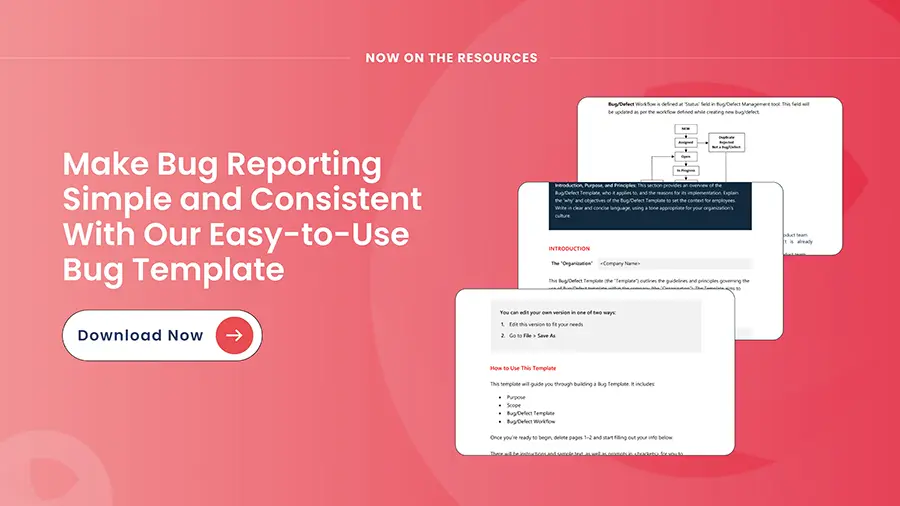The software engineering teams are trying to achieve three basic goals: develop products faster, achieve the highest quality possible, and using new age technologies for better employee productivity. While these goals are attractive, achieving them can be a long-standing task. These goals can be achieved by collaborating with right partners that can help in effective implementation of test automation, quality assurance, and quality engineering strategies.
While selecting the right partner is important, there is more to the selection of right QA and testing partner. In this article we are trying to cover all the questions related to the outsourcing of right QA and testing partners.
Introduction to Software Testing
Software testing refers to the set of processes and methods of evaluating and verifying that a digital application or product meets its requirements and work as expected providing users the ultimate buying experience. The software released must be of highest quality, security, and reliability. Software testing is an integral part of the software development lifecycle and helps in ensuring that minimal bugs are passed into production and doesn’t hinder the user needs.
Introduction to Quality Assurance
Quality Assurance is a broader term that involves testing activities and more emphasis on quality assurance methods from the beginning of software development lifecycle. Quality Assurance starts from inculcating the quality mindset and making quality a shared responsibility between engineering, business, and executive team.
Quality Assurance includes activities like requirements analysis, test planning, defect tracking, and release management. Software testing can be termed as a subset of quality assurance. Quality Assurance activities go beyond the usual testing activities like identifying and fixing defects in the software.
Why Outsource Your QA & Testing Function?
As leaders are constantly talking about digital acceleration and becoming digital natives, there is an increasing push on organizations to adopt better ways of software development and testing. This is not possible with in-house QA team who are always firefighting and looking for ways to finish the test automation suite just before the release cycle. Application testing and QA leaders are constantly seeking partnerships that helps them in innovating and staying head of the market in terms of releasing better quality products.
With this context, QA and application testing leaders can transform their tradition application testing process to a specialized and innovative functional arm. Enhops works with Fortune 500 and 1000 companies to take their QA transformation to new heights, and we have achieved nearly 99% test automation for the existing and new product releases for all our clients.
Benefits of outsourcing QA and Software Testing function
In this article, we are further elaborating on the benefits of outsourcing QA and Software Testing Function.
- Access to the right skills and expertise
There is no refuting that in-house QA teams are often challenged by time, skills, and ability to implement and function with right tools. This makes the QA transformation journey really difficult for organizations of all sizes and across all domains.
Outsourcing the QA and software testing function makes it easy for organizations of all sizes and domain to bring the required expertise to make their testing function more efficient and enabling them to deliver better customer experience.
Organizations with special expertise in Quality Engineering, Quality Assurance, and Software Testing brings in deep understanding of the latest tools and techniques and they can help businesses improve their testing processes. They also have customized frameworks, tools and techniques that enable improved test coverage across a wide variety of software applications. Test automation experts also bring in domain level expertise and reduces manual testing efforts to a huge extent. These testing service providers also help in re-skilling and up-skilling of current manual testers (if any organization has) and helps them in achieving better career traction by moving them into the field of test automation.
- Bring in Cost Savings
When it comes to software development and testing, a bug slipped into production can cost millions for us. This is where robust test automation practices, security testing, DevTestOps, Shift-Left Testing, and Quality Culture comes into picture.
In a busy software engineering team, it’s impossible for developers and testing teams to scale and build quality assurance function that continues to adapt and innovate. And if this can happen, it can come at a high cost of trying and experimenting with different tools, set-ups, and team changes. These changes can be a learning curve for teams but can be daunting for organizations to handle.
This is where organizations need outsourced specialists to effectively build and run software testing and quality assurance function and implement essential tools and capabilities while keeping costs under the tab. Outsourcing testing functions bring in cost savings for businesses by reducing training and hiring costs, lower infrastructure costs, customized resource allocation, access to experts and global talent pool, discounted tools and technologies with reduced overhead costs.
This allows businesses to focus on core businesses and play on their strengths in the market. The software testing service providers also provide the flexible engagement models like Time & Material, Fixed Bid, Managed Services and Implementation model, Team Staffing and Augmentation and more. Businesses should carefully evaluate their needs and negotiate a pricing model that aligns with their project goals and budget constraints.
- Scalability according to requirements
Outsourcing provides scalability benefits by helping organizations to choose flexible resource allocation and power to scale teams up and down based on the business requirements. With this, they also have access to global talent pool with expertise in the latest testing tools and techniques. This scalability also helps organizations in cost savings by deciding on their technical testing teams based on workloads.
Overall, outsourcing QA and testing functions can help organizations to scale their testing efforts up or down as needed without sacrificing quality or efficiency. This can free up resources for organizations to focus on their core business activities.
Challenges of Outsourcing QA and Software Testing
While outsourcing provides numerous benefits for organizations, there can be some loopholes in the whole process. It is beneficial to address these challenges in the beginning of the partnership to ensure smooth partnership between organizations and service providers. Some of the common challenges often encountered in outsourcing QA and Software Testing are:
- Communication Bottlenecks – Communication challenges often arises in outsourcing engagement because of various reasons such as time zone differences, cultural and language barriers, different organizational culture and working style. However, these challenges can often be resolved by working with a reputable software testing provider who has worked with client in onshoring, offshoring, and nearshoring model. Establish clear communication channels from beginning of engagement and agree for periodic assessments between the organizations to ensure that SLAs are beign delivered on time.
Pro Tip – Establish outcome-based delivery model with your software testing partner. Enhops is known for its outcome-based delivery model and has worked with more than 100+ clients helping them establish clear testing strategy and execution plan. Agree on the governance model and plan to involve key stakeholders required from both parties to arrive at a conclusion.
- Data Security Concerns – Data Security is a top concern for businesses of all sizes. In outsourcing model, businesses tend to lose some control over data in order to provide data access to the testing partner. This can often lead to intended or unintended data breaches and significantly impact the security of the businesses. These breaches can also lead to unauthorized access to data to people outside the vendor and organization.
Pro Tip – In order to avoid any data and application security issues, it is important to conduct a thorough security assessment and vet all the devices, networks, on-prem and cloud applications being used for testing. Make sure that the outsourcing provider has the necessary security controls in place, such as data encryption, access control, and intrusion detection systems. Regularly monitor the outsourcing provider’s security performance.
- Compromised Quality – In outsourcing engagement, often the deliverables can be of poor and compromised quality with missed deadlines. This can be because of sub-par team and service provider or lack of skilled manpower. It is important to work with a full-cycle testing experts who has experience and automation experts in handling your end-to-end requirements.
Pro Tip – Engage with service provide on outcome-based partnership model.
- Lack of Domain Expertise – This can be a serious challenge in the outsourcing model because if the test automation engineers will lack the necessary understanding and knowledge of client’s communication and industry, it can lead to delayed deliverables. The knowledge transfer can be time taking and the cost of overall project might increase in order to address challenges caused by the lack of domain expertise.
Pro Tip – Develop an extensive knowledge transfer plan involving teams from both sides. It is also important to use a project management tool that track the overall progress of the project. Work with the software testing partner who has automation experts with cross-domain expertise.
How to Choose a Software Testing Outsourcing Partner
-
- Consider your specific needs and requirementsEvery organization has different quality needs, and every application development team has different definition of embedding quality in their development lifecycle. It is important to understand specific needs and requirements of testing and quality assurance function before approaching any vendor. Additionally, evaluate your current testing and quality assurance function, number of tests executed on manual and automated basis, automation coverage and existing tools. This helps in understanding the current state of testing and QA function and then draw a comparison whenever needed.
- Evaluate the vendor’s experience and expertiseWork with a competent and known brands in the space of quality assurance and software testing. The brand name gives the cushion of quality deliverables and SLA-driven work. This also helps in validating the software testing partner reputation within the industry and ask for referenceable clients. Consider asking for their current strength of automation experts and domain experts, how many years of experience they have in the QA and Software testing space.It is also important to understand their take on co-creating solution, innovation, adopting and adapting to new trends and technologies, and driving cultural change about quality across the organization.
-
- Analyse their working models and what suits for youBased on the type of project, length of engagement, business goals, and team skills, it is advisable to talk to your quality assurance partner about the different types of outsourcing models like nearshoring, onshoring, off-shoring, and hybrid. In addition to these, outsourcing partners now work on various working models like project-based, time and material, staff augmentation, and dedicated team.
- Consider your specific needs and requirementsEvery organization has different quality needs, and every application development team has different definition of embedding quality in their development lifecycle. It is important to understand specific needs and requirements of testing and quality assurance function before approaching any vendor. Additionally, evaluate your current testing and quality assurance function, number of tests executed on manual and automated basis, automation coverage and existing tools. This helps in understanding the current state of testing and QA function and then draw a comparison whenever needed.
Build an offshore testing team
Unable to test your own software because of skills shortage?
Talk to us!
| Time and Material | Project Based | Staff Augmentation | Dedicated Team |
| The client pays the QA partner for the actual time and materials spent on the project. | The client contracts with the QA partner for a specific project. | QA partner provides additional staff to supplement the client’s in-house team. | QA partner provides a dedicated team of employees to work on the client’s projects. This model is often used for complex or long-term projects. |
| T&M contracts are flexible and transparent. Can be adapted to changing requirements scope. Risk sharing between client and QA partner | Project based projects provide cost savings, access to expertise without increasing the overhead expenses, scalability, and flexibility. | Access to better manpower while savings costs. Flexibility to ramp up and down team quickly with notice to QA partner. | Access to functional and technical expertise. Outcome based delivery with the ability to scale up and down requirements. Opportunity to cross-skill and up-skill client staff. |
| Cost uncertainty due to project overruns. Lack of incentive to control costs and highly complex to manage. | Communication challenges due to different time zones, loss of control as the QA partner will be responsible for managing the project and delivering results. | QA partner will just focus on filling the skills gap and client won’t be able to take advantage of the actual expertise they possess. | Can be long engagements and sometimes cost can rise initially. QA partner has to be validated so there’s no IP theft and data concerns. |
Best Practices for Outsourcing Software Testing and Quality Assurance
While QA outsourcing is a great way to revitalize quality and testing function for any organization, it is important to choose the right outsourcing partner and follow certain best practices to ensure a successful outcome.
-
-
- Establish clear business goals related to quality – In last few decades, technological developments have led to the increased focus on software and digital applications quality. As a result, there are business goals directly or indirectly related to quality assurance and software testing, this requires outlining a documented strategy around quality assurance before businesses look to outsource their quality functions.
This also helps in having a dedicated budget, strategy, results and efforts that are expected out of QA and software testing teams.
- Establish clear communication and collaboration channels – A non-clear and inconsistent communication often dooms the whole outsourcing project. Establish clear rules about the communication and meeting cadences to keep both parties informed about the progress of the project. Invest in right project management and communication tools, try to have overlapping hours between on-site and off-site teams for better coordination and collaboration.
- Define outcome-based goals – Outcome-based and value-driven delivery keeps the QA and testing partner accountable throughout the project and helps in achieving business goals. Outcome-based goals focus on metrics and delivering concrete results like better releases, lower bugs in production, better automation coverage rather than just developing test cases and maintaining it.
- Provide the vendor with all necessary resources and information – When outsourcing QA and software testing, it is crucial to establish proper knowledge transfer sessions between the two teams to ensure smooth functioning and successful project execution. they help to ensure that the QA partner has a clear understanding of the project’s requirements, scope, and goals. Second, KT sessions help to transfer the knowledge and expertise of the in-house QA team to the QA partner. This is essential for ensuring that the QA partner can effectively test the software and identify any potential defects.
- Establish clear business goals related to quality – In last few decades, technological developments have led to the increased focus on software and digital applications quality. As a result, there are business goals directly or indirectly related to quality assurance and software testing, this requires outlining a documented strategy around quality assurance before businesses look to outsource their quality functions.
-
Creating Value through QA and Software Testing Outsourcing
QA and Software Testing are now integral part of the overall software development lifecycle. Hence it is important for technology leaders to create separate strategies for maintaining the overall quality of the digital applications and software products. However, execution of these strategies entirely depends on the talent, manpower, tools and technology knowledge, their engineering team possess. Hence, it is important to look for options to outsource their quality assurance and software testing functions.
At Enhops, we understand the importance of quality in the race of digital transformation and helping organizations across the world to revitalize their testing functions. Our core focus areas are setting up robust and fully-functional agile Testing Center of Excellence, Test Automation for modern and legacy platforms, Performance Engineering and Security Testing services, and Quality Assurance Consulting and Advisory.
Read more about our work here.
Learn how TCoEs can help you in
relooking at the quality and testing function.




